Whether you’re a business looking to rent a commercial space or you’re a landlord with property to rent out, the commercial rental process is slightly different from the residential one. If you’re worried about beginning the process and want to understand what’s about to happen, then we’ve got you covered.
Below, we’re going to go through each stage, from filling in the commercial rental application form to financing the agreement. Take a look below now to learn more.
Application Preparation
Before you begin looking for spaces and entering into lease agreements, you need to consider a few things, including what you actually need from the space. If you’re a retail store, you will have very different needs from someone opening a bar or cafe.
Make a list of all the things you need from the commercial space, including the size, any equipment needs, and even your budget, to make sure that your search is simple and takes you only to viable properties.
Remember that renting is actually the only option; you might opt for a mortgage and buy one instead.
The Rental Application
When you’ve found a place you like, you will need to fill out a rental application. This will mean gathering all the necessary documentation and ensuring everything is correct before submitting the application.
Review and Evaluation
This part is mostly for the landlord to screen any potential tenants. They will run credit and background checks and verify the financial standing of the business. For the tenant, this is the waiting period where you find out whether you meet the landlord’s standards or not.
Remember that if you are rejected from one property, it does not mean that another landlord would not gladly welcome you. Don’t be disheartened by rejection.
Negotiating Lease Terms
If the landlord approves you as a tenant, you will move on to the negotiation process. During this process, you will have the opportunity to negotiate terms, like your lease duration, and will be able to communicate with the landlord or property manager.
During this phase, there may be things you want from the landlord that they are unwilling to give. Seek legal counsel if you need extra support in getting what you need as a business from this commercial lease.

Finalizing the Lease Agreement
This stage is relatively straightforward and requires a review of the lease and a signature. We recommend that you have a solicitor look over the commercial lease agreement to ensure that all of the terms you negotiated are in there and that everything is fair.
You will also need to pay any security deposits at this stage. This is a sum of money that covers the landlord for any unpaid rent and damage done by the tenant and is very common in lease agreements of all kinds.
Last, you will want to secure the move-in details, i.e. what day you’re moving in and when utilities will be fitted, like gas, water, and WiFi. You may also be remodeling or renovating the space to suit your brand. This means you need to schedule contractors and painters, etc., and leave yourself enough time to get everything in order before you open the business to the public.
Post-Approval Considerations
Once you’ve entered into the lease agreement, you may contact the landlord regarding repairs and maintenance if they take on this responsibility in the lease agreement. You may also want to extend your lease or take advantage of a break clause.
Remember that during commercial property disputes, it is essential to remain calm, keep a record of everything, and seek professional advice if necessary.
Common Mistakes to Avoid
Below are some of the common mistakes that people make when signing commercial lease agreements and how you can avoid them.
- Not understanding the lease terms: Review the whole thing and seek professional advice if you’re unsure.
- Rushing through the process: While getting open is exciting, if you don’t do proper research, you might miss something. Conduct proper due diligence.
- Failing to negotiate: You have the opportunity to get terms that suit you, so don’t miss out. Negotiate the contract that you want.
- Not assessing the location or the property: When preparing for a commercial lease, you need to be sure that you have the right property for your business. Do some research on whether the property is actually right for your needs, and do the same with the location when applicable.
- Not keeping a record of everything: When it comes to lease negotiations, it’s always best to have everything in writing, just in case.
- Not having flexibility or a way to break the lease: If you’re a new business, you need to be able to get out of the lease if things aren’t going well. Make sure you have a break clause written into the lease for peace of mind and stability.
Final Thoughts
Commercial lease agreements differ from residential ones, so being prepared for the process can ensure you don’t miss an opportunity to get more favorable terms. Remember to negotiate and advocate for yourself and ensure that there is flexibility built into your lease. As a new business, you need to have an exit strategy.


